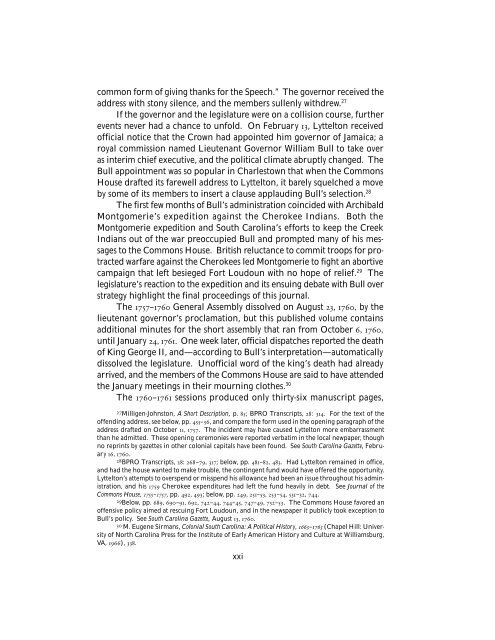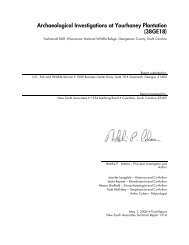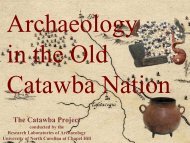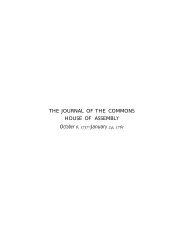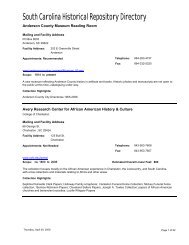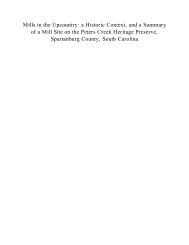The Journal of the Commons House of Assembly
The Journal of the Commons House of Assembly
The Journal of the Commons House of Assembly
You also want an ePaper? Increase the reach of your titles
YUMPU automatically turns print PDFs into web optimized ePapers that Google loves.
common form <strong>of</strong> giving thanks for <strong>the</strong> Speech.” <strong>The</strong> governor received <strong>the</strong>address with stony silence, and <strong>the</strong> members sullenly withdrew. 27If <strong>the</strong> governor and <strong>the</strong> legislature were on a collision course, fur<strong>the</strong>revents never had a chance to unfold. On February 13, Lyttelton received<strong>of</strong>ficial notice that <strong>the</strong> Crown had appointed him governor <strong>of</strong> Jamaica; aroyal commission named Lieutenant Governor William Bull to take overas interim chief executive, and <strong>the</strong> political climate abruptly changed. <strong>The</strong>Bull appointment was so popular in Charlestown that when <strong>the</strong> <strong>Commons</strong><strong>House</strong> drafted its farewell address to Lyttelton, it barely squelched a moveby some <strong>of</strong> its members to insert a clause applauding Bull’s selection. 28<strong>The</strong> first few months <strong>of</strong> Bull’s administration coincided with ArchibaldMontgomerie’s expedition against <strong>the</strong> Cherokee Indians. Both <strong>the</strong>Montgomerie expedition and South Carolina’s efforts to keep <strong>the</strong> CreekIndians out <strong>of</strong> <strong>the</strong> war preoccupied Bull and prompted many <strong>of</strong> his messagesto <strong>the</strong> <strong>Commons</strong> <strong>House</strong>. British reluctance to commit troops for protractedwarfare against <strong>the</strong> Cherokees led Montgomerie to fight an abortivecampaign that left besieged Fort Loudoun with no hope <strong>of</strong> relief. 29 <strong>The</strong>legislature’s reaction to <strong>the</strong> expedition and its ensuing debate with Bull overstrategy highlight <strong>the</strong> final proceedings <strong>of</strong> this journal.<strong>The</strong> 1757–1760 General <strong>Assembly</strong> dissolved on August 23, 1760, by <strong>the</strong>lieutenant governor’s proclamation, but this published volume containsadditional minutes for <strong>the</strong> short assembly that ran from October 6, 1760,until January 24, 1761. One week later, <strong>of</strong>ficial dispatches reported <strong>the</strong> death<strong>of</strong> King George II, and—according to Bull’s interpretation—automaticallydissolved <strong>the</strong> legislature. Un<strong>of</strong>ficial word <strong>of</strong> <strong>the</strong> king’s death had alreadyarrived, and <strong>the</strong> members <strong>of</strong> <strong>the</strong> <strong>Commons</strong> <strong>House</strong> are said to have attended<strong>the</strong> January meetings in <strong>the</strong>ir mourning clo<strong>the</strong>s. 30<strong>The</strong> 1760–1761 sessions produced only thirty-six manuscript pages,27 Milligen-Johnston, A Short Description, p. 85; BPRO Transcripts, 28: 314. For <strong>the</strong> text <strong>of</strong> <strong>the</strong><strong>of</strong>fending address, see below, pp. 455–56, and compare <strong>the</strong> form used in <strong>the</strong> opening paragraph <strong>of</strong> <strong>the</strong>address drafted on October 11, 1757. <strong>The</strong> incident may have caused Lyttelton more embarrassmentthan he admitted. <strong>The</strong>se opening ceremonies were reported verbatim in <strong>the</strong> local newpaper, thoughno reprints by gazettes in o<strong>the</strong>r colonial capitals have been found. See South Carolina Gazette, February16, 1760.28 BPRO Transcripts, 28: 268–79, 317; below, pp. 481–82, 483. Had Lyttelton remained in <strong>of</strong>fice,and had <strong>the</strong> house wanted to make trouble, <strong>the</strong> contingent fund would have <strong>of</strong>fered <strong>the</strong> opportunity.Lyttelton’s attempts to overspend or misspend his allowance had been an issue throughout his administration,and his 1759 Cherokee expenditures had left <strong>the</strong> fund heavily in debt. See <strong>Journal</strong> <strong>of</strong> <strong>the</strong><strong>Commons</strong> <strong>House</strong>, 1755–1757, pp. 492, 493; below, pp. 249, 251–53, 253–54, 531–32, 744.29 Below, pp. 689, 690–91, 692, 742–44, 744–45, 747–49, 752–53. <strong>The</strong> <strong>Commons</strong> <strong>House</strong> favored an<strong>of</strong>fensive policy aimed at rescuing Fort Loudoun, and in <strong>the</strong> newspaper it publicly took exception toBull’s policy. See South Carolina Gazette, August 13, 1760.30 M. Eugene Sirmans, Colonial South Carolina: A Political History, 1663–1763 (Chapel Hill: University<strong>of</strong> North Carolina Press for <strong>the</strong> Institute <strong>of</strong> Early American History and Culture at Williamsburg,VA, 1966), 338.xxi


